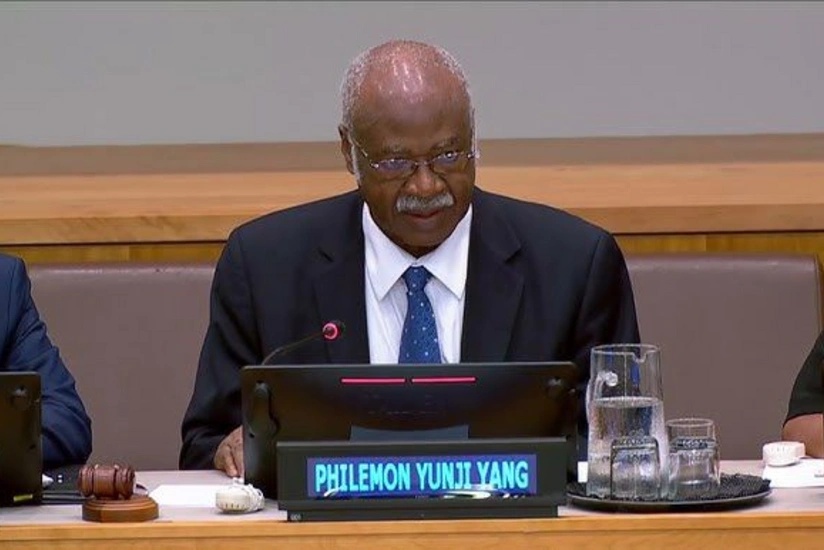President of UN General Assembly: Azerbaijan"s COP29 Presidency was timely, transformative - INTERVIEW
- 06 September, 2025
- 12:28

President of the 79th session of the UN General Assembly, Philemon Yang, responded to the questions of Report"s US Bureau just days before the end of his term. The President of the Assembly spoke about the achievements attained during the session, a number of important issues in the region, as well as the successes of Azerbaijan"s COP29 Presidency.
- Your Excellency, as your term as President of the 79th Session of the UN General Assembly comes to a close, how would you reflect on its key achievements and the challenges faced?
- At a time when multilateralism is being tested as never before, the 79th session of the General Assembly has played an important role in reaffirming global cooperation. The Pact for the Future, adopted at the start of the session, set the stage for our work. It called for a renewed commitment to collective action, particularly to achieve the Sustainable Development Goals (SDGs). Throughout the session, we engaged closely with Member States to ensure the implementation of the Pact aligned with national priorities and contexts. We also placed the spotlight on a range of global issues: eliminating child labour, addressing the impact of the illicit flow of small arms on sustainable development and advancing efforts to close the digital divide in Africa. Initiatives such as these not only shaped the global agenda but also demonstrated the session"s success in driving meaningful dialogue and action. But the successes of this session were also marked by the enormous challenge posed by the funding situation of the United Nations. The liquidity crisis is real and will not be resolved without the deep commitment of all Member States to the UN and its mission. I call on all Member States to ensure that they pay in full and on time their dues to the Organization so that it can achieve its goals towards a better future for all. I endorse the Secretary-General"s efforts - with the support of Member States - to remedy the impact of the liquidity situation through necessary reforms. Our support for the UN must be unwavering.
- As you mentioned, strengthening multilateralism was a core theme of your mandate. What progress has been made in restoring trust among Member States and reinvigorating global cooperation?
- The strong foundation for international cooperation and multilateralism that is anchored in the purposes, principles, and objectives of the Charter of the United Nations has guided our collective efforts to restore trust among Member States and to reinvigorate global cooperation at a time when both are urgently needed. A milestone in this regard was the adoption of the Pact for the Future and its Annexes - the Global Digital Compact and the Declaration on Future Generations. Its adoption was not only a clear reaffirmation of the commitment of Member States to multilateralism, but also a recognition of the urgent need to accelerate progress toward the SDGs. Now through the ongoing implementation of the Pact, we have begun to see encouraging steps at both the national and international levels to turn words into action.
This momentum was further underscored in June when we commemorated the 80th anniversary of the signing of the UN Charter. That occasion provided Member States with an opportunity to renew their commitment to dialogue, solidarity, and collective action, reaffirming that the principles of the Charter remain as relevant today as they were in 1945. The session has shown that, despite renewed geopolitical tensions, multilateralism remains the best way forward for humanity. The United Nations continues to be the most representative and inclusive platform to confront our common challenges as demonstrated through the adoption of the Sevilla Commitment, which reaffirms the importance of meaningfully closing the financing gap to achieve the SDGs. The establishment of a new Governance Architecture on Artificial Intelligence also emphasizes the urgency of global efforts to inclusively assess and address the potential impact, opportunities and risks of the rapid development of emerging technologies such as AI.
- The world continues to grapple with overlapping crises, from armed conflicts to humanitarian emergencies. In what ways has the General Assembly served as a platform for dialogue and peaceful resolution during your presidency?
- During this session, discussions on the role of the General Assembly on matters of peace and security have gained increasing prominence, particularly against the backdrop of a frequently deadlocked Security Council. During this session alone, we have witnessed the resumption of Emergency Special Sessions in the General Assembly in response to the crisis in the Middle East and the war in Ukraine. Two "veto initiative" meetings -including one on Sudan - have also taken place, underscoring the continuing relevance of this issue, and the growing frustration among the membership on the use of the veto in the UN Security Council on key peace and security and humanitarian issues. The Assembly has served as a platform for dialogue, including in its ability to adopt resolutions - on issues such as Ukraine and Gaza- which demonstrate the strong voice and political will of the wider UN membership. My key message, as President of the General Assembly, has been the importance of resolving conflict through dialogue and diplomacy based on the UN Charter and international law.
Recognizing the growing humanitarian crises-Afghanistan, Haiti, Gaza, Myanmar, Sudan and beyond- the 79th session provided an opportunity for Member States to discuss ways to address challenges and gaps in the implementation of international humanitarian law. In this regard, I held an informal interactive dialogue entitled "Preserving human dignity in armed conflict" in January 2025, where discussions focused on strengthening multilateral and national efforts to enhance compliance with international humanitarian law. The dialogue highlighted a fundamental principle: that even war has rules, and international humanitarian law must be upheld.
- As we approach 2030, how do you assess the international community"s commitment to the Sustainable Development Goals, and what urgent actions remain most critical?
- As we approach 2030, it is clear that while progress has been made toward achieving the SDGs, our collective commitment must be strengthened, as over a third of the SDG targets remain uneven and insufficient. The 2030 Agenda for Sustainable Development remains our shared blueprint for people, planet, and prosperity, and crucially, for fostering stability and peace. We know that where development falters, instability often follows, and where opportunity and resilience take root, peace has a stronger chance to prevail. Yet global crises, ranging from climate change and conflict to debt distress and widening inequalities, have set us back, demanding renewed urgency and collective resolve. A critical area of focus is financing for development, in which the international community has recently taken an important step forward.
The adoption of the outcome of the recent Fourth International Conference on Financing for Development in Seville reaffirmed that achieving the SDGs requires bold action to scale up affordable financing, reform the international financial architecture and address unsustainable debt burdens. Member States agreed that without closing the financing gap, especially for countries most in need, our commitments will remain out of reach. What remains most urgent now is to translate these commitments into accelerated action. We must ensure that financing flows support sustainable, inclusive, and resilient development; that investments in science, technology, and innovation are expanded and accessible to all; and that multilateral cooperation is strengthened to meet cross-border challenges. Looking ahead, the 2030 Agenda for Sustainable Development, the Pact for the Future and the Sevilla Commitment complement our efforts by offering a broader vision for strengthened multilateralism, for enhanced global cooperation for sustainable development and for a more just, inclusive and peaceful world.
- Climate change remains a defining challenge of our time. What role has the General Assembly played in advancing climate action and environmental responsibility under your leadership?
- The General Assembly"s universal membership continues to serve as a platform for equity, solidarity, and accountability, particularly on climate action. The Pact for the Future, adopted right at the beginning of my Presidency, provided political momentum during the 79th session of the General Assembly, by reaffirming Member States; resolve to strengthen actions to address climate change. I represented the General Assembly at the COP29 in Azerbaijan where I advocated for the additionally of climate finance. During the year, I also had the honor to convene an informal briefing by the President-designate of COP30 to encourage a dialogue among Member States on the expectations for COP30. I also represented the General Assembly at the landmark hearing of the Advisory Opinion of the International Court of Justice where the judges unanimously reaffirmed States; obligations to address climate change. This historic ruling behooves all States to act urgently to address the existential threat of climate change by cooperating to cut emissions, by implementing climate agreements, and protecting vulnerable populations and ecosystems from harm.
- At COP29, hosted by Azerbaijan, you delivered a powerful speech emphasizing global solidarity on climate action. How do you assess the significance of Azerbaijan"s COP29 presidency, and in what ways do you believe this summit has contributed to the broader climate agenda of the UN General Assembly?
- Azerbaijan"s COP29 presidency proved timely and transformative, positioning it as a bridge between fossil-fuel economies and climate-vulnerable nations. By highlighting regional adaptation challenges and promoting just transitions, the COP29 presidency deepened the global dialogue on fairness and solidarity.
I believe that the summit advanced progressive outcomes such as a strengthened commitment to climate finance, a principled roadmap for inclusive energy transition through the finalization of the carbon market rules under the Paris Agreement, and progress on the operationalization of the Loss and Damage Fund. These achievements, in my view, have bolstered the General Assembly"s broader climate agenda that has been outlined in the Assembly"s resolutions on sustainable development, climate justice, and multilateral climate governance. I look forward to further action in Brazil later this year.
